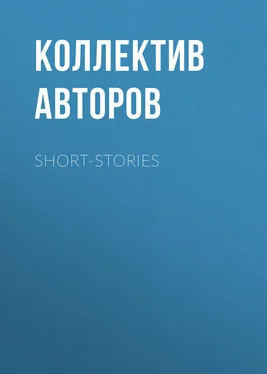Коллектив авторов - Short-Stories
Здесь есть возможность читать онлайн «Коллектив авторов - Short-Stories» — ознакомительный отрывок электронной книги совершенно бесплатно, а после прочтения отрывка купить полную версию. В некоторых случаях можно слушать аудио, скачать через торрент в формате fb2 и присутствует краткое содержание. Жанр: foreign_antique, foreign_prose, Детская проза, на английском языке. Описание произведения, (предисловие) а так же отзывы посетителей доступны на портале библиотеки ЛибКат.
- Название:Short-Stories
- Автор:
- Жанр:
- Год:неизвестен
- ISBN:нет данных
- Рейтинг книги:5 / 5. Голосов: 1
-
Избранное:Добавить в избранное
- Отзывы:
-
Ваша оценка:
- 100
- 1
- 2
- 3
- 4
- 5
Short-Stories: краткое содержание, описание и аннотация
Предлагаем к чтению аннотацию, описание, краткое содержание или предисловие (зависит от того, что написал сам автор книги «Short-Stories»). Если вы не нашли необходимую информацию о книге — напишите в комментариях, мы постараемся отыскать её.
Short-Stories — читать онлайн ознакомительный отрывок
Ниже представлен текст книги, разбитый по страницам. Система сохранения места последней прочитанной страницы, позволяет с удобством читать онлайн бесплатно книгу «Short-Stories», без необходимости каждый раз заново искать на чём Вы остановились. Поставьте закладку, и сможете в любой момент перейти на страницу, на которой закончили чтение.
Интервал:
Закладка:
"That is because I have no troubles," replied Thord. To this the priest said nothing, but after a while he asked: "What is your pleasure this evening?"
"I have come this evening about that son of mine who is to be confirmed to-morrow."
"He is a bright boy."
"I did not wish to pay the priest until I heard what number the boy would have when he takes his place in the church to-morrow."
"He will stand number one."
"So I have heard; and here are ten dollars for the priest."
"Is there anything else I can do for you?" inquired the priest, fixing his eyes on Thord.
"There is nothing else."
Thord went out.
Eight years more rolled by, and then one day a noise was heard outside of the priest's study, for many men were approaching, and at their head was Thord, who entered first.
The priest looked up and recognized him.
"You come well attended this evening, Thord," said he.
"I am here to request that the banns may be published for my son: he is about to marry Karen Storliden, daughter of Gudmund, who stands here beside me."
"Why, that is the richest girl in the parish."
"So they say," replied the peasant, stroking back his hair with one hand.
The priest sat a while as if in deep thought, then entered the names in his book, without making any comments, and the men wrote their signatures underneath. Thord laid three dollars on the table.
"One is all I am to have," said the priest.
"I know that very well; but he is my only child; I want to do it handsomely."
The priest took the money.
"This is now the third time, Thord, that you have come here on your son's account."
"But now I am through with him," said Thord, and folding up his pocket-book he said farewell and walked away.
The men slowly followed him.
A fortnight later, the father and son were rowing across the lake, one calm, still day, to Storliden to make arrangements for the wedding.
"This thwart 3 3 3:28 thwart. A seat, across a boat, on which the oarsman, sits.
is not secure," said the son, and stood up to straighten the seat on which he was sitting.
At the same moment the board he was standing on slipped from under him; he threw out his arms, uttered a shriek, and fell overboard.
"Take hold of the oar!" shouted the father, springing to his feet, and holding out the oar.
But when the son had made a couple of efforts he grew stiff.
"Wait a moment!" cried the father, and began to row toward his son.
Then the son rolled over on his back, gave his father one long look, and sank.
Thord could scarcely believe it; he held the boat still, and stared at the spot where his son had gone down, as though he must surely come to the surface again. There rose some bubbles, then some more, and finally one large one that burst; and the lake lay there as smooth and bright as a mirror again.
For three days and three nights people saw the father rowing round and round the spot, without taking either food or sleep; he was dragging the lake for the body of his son. And toward morning of the third day he found it, and carried it in his arms up over the hills to his gard 4 4 4:21 gard. A Norwegian farm.
.
It might have been about a year from that day, when the priest, late one autumn evening, heard some one in the passage outside of the door, carefully trying to find the latch. The priest opened the door, and in walked a tall, thin man, with bowed form and white hair. The priest looked long at him before he recognized him. It was Thord.
"Are you out walking so late?" said the priest, and stood still in front of him.
"Ah, yes! it is late," said Thord, and took a seat.
The priest sat down also, as though waiting. A long, long silence followed. At last Thord said, —
"I have something with me that I should like to give to the poor; I want it to be invested as a legacy in my son's name."
He rose, laid some money on the table, and sat down again. The priest counted it.
"It is a great deal of money," said he.
"It is half the price of my gard. I sold it to-day."
The priest sat long in silence. At last he asked, but gently, —
"What do you propose to do now, Thord?"
"Something better."
They sat there for a while, Thord with downcast eyes, the priest with his eyes fixed on Thord. Presently the priest said, slowly and softly, —
"I think your son has at last brought you a true blessing."
"Yes, I think so myself," said Thord, looking up, while two big tears coursed slowly down his cheeks.
BIOGRAPHY
Björnstjerne Björnson, Norse poet, novelist, dramatist, orator, and political leader, was born December 8, 1832, and died in Paris, April 26, 1910. From his strenuous father, a Lutheran priest who preached with tongue and fist, he inherited the physique of a Norse god. He possessed the mind of a poet and the arm of a warrior. At the age of twelve he was sent to the Molde grammar school, where he proved himself a very dull student. In 1852 he entered the university in Christiana. Here he neglected his studies to write poetry and journalistic articles.
In politics Björnson was a tremendous force. Dr. Brandes has said; "To speak the name of Björnson is like hoisting the colors of Norway." He was honored as a king in his native land. He won this recognition by no party affiliation, but by his natural gifts as a poet. His magnetic eloquence, great message, and sterling character compelled his countrymen to follow and honor him. He says of his success in this field: "The secret with me is that in success as in failure, in the consciousness of my doing as in my habits, I am myself. There are a great many who dare not, or lack the ability, to be themselves." For his views on political issues the following references may well be used: Independent . January 31, 1901, pp. 253-257; Current Literature , November, 1906, p. 581; and Independent , July 13, 1905, pp. 92-94.
Björnson and Ibsen, the two foremost men of Norway, were very closely associated throughout life. They were schoolmates, and both were interested in writing and producing plays. Ibsen's son, Dr. Sigurd Ibsen, married Björnson's daughter, Bergilot. These two great writers were direct contrasts in nearly everything: Björnson lived among his people, Ibsen was reserved; Björnson played the rôle of an optimistic prophet, Ibsen, that of a pessimistic judge; the former was always a conciliatory spirit, the latter a revolutionist; and Björnson proved himself a patriotic Norwegian, Ibsen, a man of the entire world.
Lack of space forbids the inclusion of a list of Björnson's writing's. High school teachers will find suitable selections in the list of collateral readings that follows. Those who wish a complete bibliography of his works will find it in Bookman , Volume II, p. 65. Translations of his works by Rasmus B. Anderson, Houghton Mifflin Co., and Edmund Gosse, the Macmillan Co., will furnish students extensive and standard readings of this master story-teller.
CRITICISMS
Björnson, in his masterly character delineations, seldom produces portraits. He gives the reader suggestive glimpses often enough and of the right quality and arrangement to produce a full and vigorous conception of his characters. His female parts are especially well done. His characters present themselves to the reader by unique thinking and choice expressions. Students should analyze The Father for this phase of character building. Note also the simplicity of the words, sentences, paragraphs, and complete story arrangement, the author's originality of story conception and expression, his short, passionate, panting sentences, the poetic atmosphere that sweetens and enriches his virile writing, and the correct, religious pictures he paints of his beloved northland.
Читать дальшеИнтервал:
Закладка:
Похожие книги на «Short-Stories»
Представляем Вашему вниманию похожие книги на «Short-Stories» списком для выбора. Мы отобрали схожую по названию и смыслу литературу в надежде предоставить читателям больше вариантов отыскать новые, интересные, ещё непрочитанные произведения.
Обсуждение, отзывы о книге «Short-Stories» и просто собственные мнения читателей. Оставьте ваши комментарии, напишите, что Вы думаете о произведении, его смысле или главных героях. Укажите что конкретно понравилось, а что нет, и почему Вы так считаете.

![Коллектив авторов - Best Short Stories [С англо-русским словарем]](/books/26635/kollektiv-avtorov-best-short-stories-s-anglo-thumb.webp)










